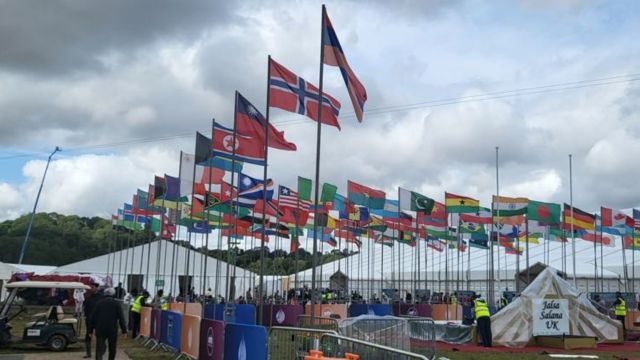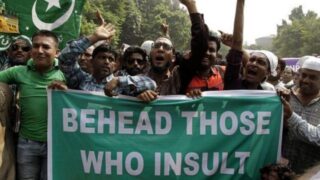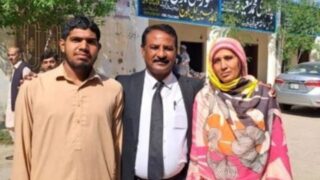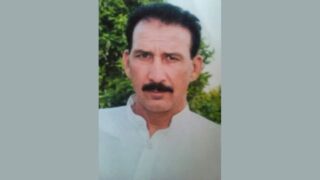“Bitter Winter” visited the annual gathering of the Ahmadiyya Muslim Jama’at in the muddy countryside of Surrey, discovering rich pearls of faith and humanity.
by Marco Respinti


“As-salamu aleykum,” “Peace be upon you.” This is a salutation that Muslims learn since their most tender age and use worldwide. In Pakistan it is fine if a Christian, a Hindu, or a Buddhist utters it. But Ahmadis cannot, even if they believe in Allah, Muhammad as His prophet, and the Quran as Allah’s revelation. In fact, conservative Muslims consider the Ahmadis as false Muslims, who fake their Islamic identity and reduce it to a caricature. Thus, they do not deserve even the limited tolerance granted to non-Muslims.
Ahmadis celebrate their major community event in England. It is called “Jalsa Salana,” an Urdu expression meaning “Annual Gathering.” This custom was initiated by the founder of the movement, Mirza Ghulam Ahmad (1835–1908), in 1891 in Qadian, Punjab, India, the holy city of the Ahmadiyya Muslim Jama’at (“jama’at” meaning “community”). Then, in 1984, his 4th successor, caliph Mirza Tahir Ahmad (1928–2003), was compelled to leave his residence in Pakistan after the federal government promulgated Ordinance XX, which prohibits Ahmadi Muslims from any public expression of the Islamic faith.
Since 2005, Jalsa Salana is hosted on a 208-acre land, named Hadiqat-ul-Mahdi, or Oaklands Farm, owned by the Jama’at in the territory of the city of Alton, Surrey, some 45 miles southwest of London. Rules set by the public administration allow Ahmadis to manage their land provided they respect the rural nature of the place. So, only temporary constructions are allowed. In some twenty days, a dedicated team of hard-working volunteers from the Community built all facilities, including halls, meeting places, press rooms, broadcasting stations and studios, tents, camp kitchens, mobile toilets, parking lots. 40,000 plus people gathered for the 2023 Jalsa Salana, July 28 to 30. Then all will quickly return to normality—while the preparation team will already start preparing next year’s event.
Attendees came from a huge number of countries and from different walks of life. Access roads to the farmland precipitated in a gigantic jam that paralyzed the local traffic for hours. Some even chose to spend the nights at the site, in tents, to avoid “painful” commuting. On Friday, Jalsa Salana began with the hoisting of the Ahmadiyya flag: a white minaret on a black background, symbolizing the advent of the founder, Mirza Ghulam Ahmad, whom Ahmadis believe to be the Mahdi, the prophet of the last days who comes to restore the purity of the faith. Then his 5th successor, caliph Mirza Masroor Ahmad, the present leader of the Jama’at, delivered the sermon, presenting the spiritual focus of three days.


Prayer is the key to all. One of the posters in one of the dining halls remarks it through the words of the present caliph: “Pray much in the days of Jalsa […] while walking, standing and sitting, remain engaged in remembrance of Allah.”
Conviviality and sharing are the second main feature. It is there that the author of this article gathered testimonies of the Community’s sorrows and hopes from different attendees, most of whom will be kept anonymous for security reasons.


It is in fact always astounding to see Ahmadis free to practice abroad, while in Pakistan, which is one of their motherlands, they are harshly persecuted. In Pakistan, the Constitution prevents citizens who are “not Muslims” from accessing top public office. Gradually, the government came to interpret that clause concerning “not Muslims” as a prohibition against “non-Muslims.” It is a subtle difference, but crucial, as one expert explains. “While not-Muslim is a legal definition, non-Muslim is theological. The switch indicates the pervasive will of the state to become the referee for religious affairs, heavily interfering with faith and liberty.”
The complex of norms collectively known as “blasphemy law” is the Damocles’ sword on the heads of Pakistanis. Few know that, while the “blasphemy law” can target anyone, it was originally designated for Ahmadis. Being vague and fungible, it is a ticketing bomb.
Some years ago, Muhammad Reza, an Ahmadi Muslim, and his three younger brothers, mainstream Sunni Muslims, mourned the passing away of their father, the chief of Piplan village, Mianwali district, Pakistani Punjab. The father was an Ahmadi Muslim as well. According to the customary law, Muhammad was to succeed his father, but his brothers tried to prevent him on the basis of his religious persuasion. Yet the customary law of succession says nothing about religion. Fearing to lose power, Muhammad’s three younger brothers falsely accused him of blasphemy. He went through a real ordeal and was finally cleared of accusations in September 2000, but he had passed more than five years in jail. It was a case of lust for power, yet Ahmadi Muslims’ faith became the scapegoat.
One witness told me that some Pakistani professionals who happen to be Ahmadis bring their daily lunch from home, instead of buying it near their offices, if they are known to be Ahmadi Muslims. To avoid possible poisoning, they prefer to skip their cup of coffee or tea.
Luckily, Jalsa Salana is also a place where one can learn good stories, as this writer did from the mouth of a Pakistani excellence, Prof. Dr. Muhammad Nuri. He is the CEO and Interventional Cardiologist at the Tahir Heart Institute in the city of Rabwah, a not-for-profit state of art cardiac facility in the most impoverished area of Pakistani Punjab, as well as the Chairman of Humanity First, an NGO active in post-disaster areas of the country. Nuri works in a high place for the Jama’at. In fact, Rabwah, officially known as Chenab Nagar, is the place where on September 20, 1948, Ahmadis moved from their holy city in India, Qadian, after Pakistan was created as a Muslim state through the 1947 Partition. Yet in 1974, Pakistan declared Ahmadis non-Muslims. When open persecution begun, the 4th caliph escaped to England.


“I am fond of your country,” Nuri told me me knowing I am Italian. “Pakistani scientist Abdus Salam (1926–1996) was an Ahmadi who won the Nobel Prize for Physics in 1979. Protesting discrimination against his coreligionists, he left Pakistan in 1974 and Italy granted him the possibility to establish The International Centre for Theoretical Physics in Trieste, which was later named after him.”
Nuri gets even more solemn when he mentions the Shroud in Turin, “which I have closely studied,” he adds. Of course, for Christians who believe in its authenticity the Turin Shroud is the linen that wrapped the body of Jesus, the Son of God, the second person of the Trinity, after he died on the Cross to redeem the sins of humankind and bears the supernatural signs of His resurrection. Instead, for mainline Muslims, Jesus, whom they call Isa and consider the Messiah but not in the same redeeming sense as Christians, was directly lifted to Heaven from the cross by God. But for Ahmadi Muslims Jesus survived the crucifixion. “Joseph or Arimathea and Nicodemus,” Nuri explained, “took him in the sepulchre when he was still alive. After three days, the Essenes, a Jewish sect who followed the teachings of Isa, transported him to a secret place, curing him with a substance including myrrh and aloe. Once Isa recovered, he went on preaching in many angles of the world, ending up in India. He died a natural death in Srinagar, Kashmir, at a very venerable age.”
The third reason why Nuri loves Italy are the Christian catacombs in Rome. “They prove the truth of Christianity,” he comments. “Catacombs are like labyrinths. Christians used them to fool the Romans and escape persecutions. A detail, though, is not known by many, is that Christians used to put a dog to guard the single entrances of catacombs. When some not familiar fellows drew near, the dogs barked, launching the alarm. This is why dogs, symbols of fidelity, are welcome in families up to this day. This custom is originally Christian.”
Jalsa Salana is a place where all functions at perfection, everything is neat and clean even if the typical English whether of Surrey transforms fields into a sea of mud. Rich pearls can be found in that mud. They speak of faith and humanity, sufferance and hope, tradition and liberty. This is why for “Bitter Winter” a visit to Jalsa Salana was mandatory.









